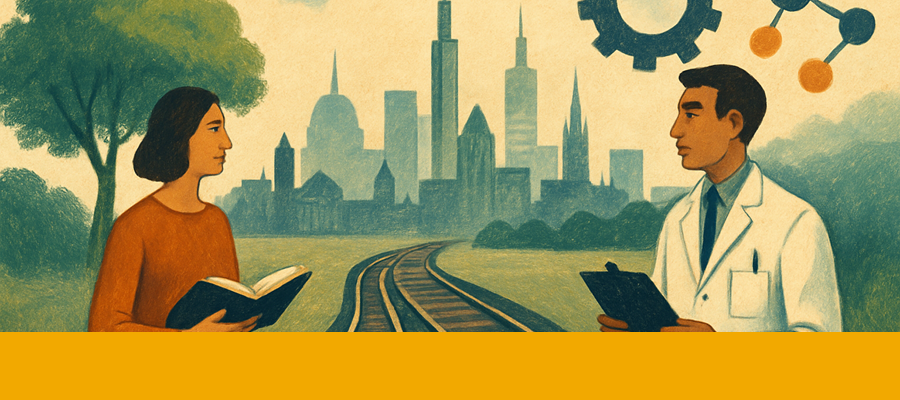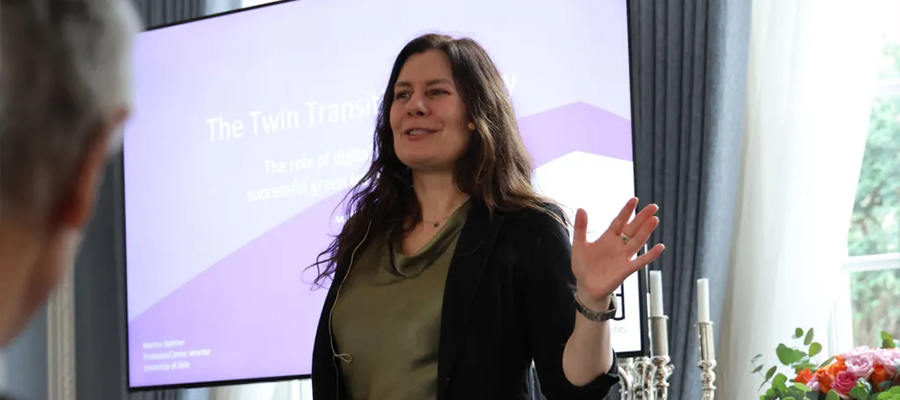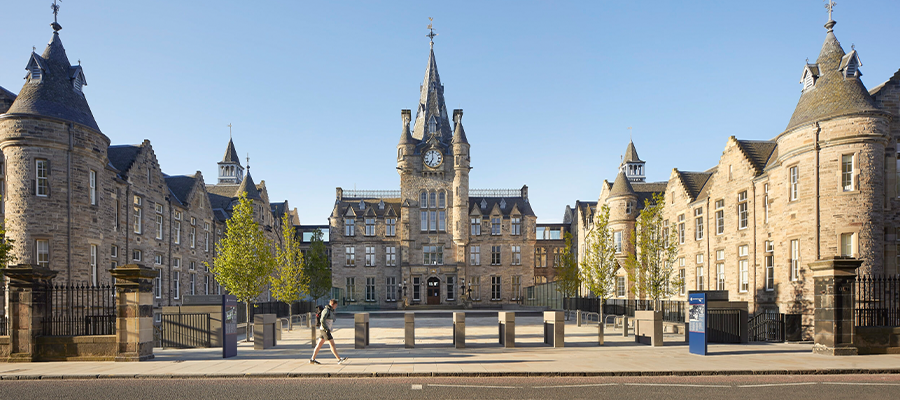Opinion: ‘Radical interdisciplinarity’ and the necessity of marrying culture and science

Professor Marion Thain on why understanding culture and the humanities is crucial for tackling today’s scientific, technological, and social challenges.
The overlooked role of culture in global challenges
“They are all as much human and social challenges.”
What role does the study of culture (and therefore the humanities disciplines) play in a context in which the great challenges of the age are largely perceived to be scientific and technical challenges? Well, I suggest one of the reasons we’re not doing better with some of the current global challenges is because they have been perceived as purely, or predominantly technical, when in fact they are all as much human and social challenges.
Lessons from Covid
This was something we should have learned from our experience of the Covid pandemic, which was perhaps the clearest illustration of the fact that we ignore human culture at our peril. We saw the solution to the pandemic as the discovery of a vaccine, yet when our brilliant scientists discovered it we found out that a sizeable chunk of the UK population did not want to take it. The reality of diverse cultural values, beliefs and practices had to be understood in order to rethink the approach.
“Medicine needs to be a culturally embedded practice.”
And what is true for a health crisis is more generally true for other areas. When a group of global tech leaders called for a pause in the development of AI about a year ago, the major challenges for our digital future were being recognised not as technical but as ethical, social and cultural.

Professor Marion Thain
The need for integrated solutions
We are now at a point where we’ve seen the limitations of an approach that segregates knowledge and conceives of technical solutions without cultural awareness. Since the pandemic there’s been a growing realisation of the need for relational, socially aware, and human-cantered solutions that take account of individual experience and need.
The study of culture through the humanities has never been more important. The humanities bring expertise that is informed conceptually, historically, imaginatively. They work with a deep understanding of human culture, media and language.
It is this profound knowledge of the past, this sophisticated conceptual thinking, this creative thinking and this innovative engagement with human culture that can be brought to such great effect within broader arenas. This is the time to recognise and, crucially, realise the huge potential of cultural expertise to help us respond resourcefully and effectively to things that matter in collaboration with science, engineering and medicine.
From interdisciplinarity to radical interdisciplinarity
But, I hear you cry, we’ve been practicing interdisciplinarity approaches for literally decades! It’s true: ‘interdisciplinarity’ has been a buzz word since I started my career; but much of that has been rather limited in its ambitions in the sense that it has concerned neighbouring disciplines (cognate fields) working with one another, or it has been a ‘tacking on’ of another discipline rather than a true investigative partnership.
“The bringing together of humanities and sciences in true equal partnership collaboration.”
Where I think we’re seeing the real returns now is in what I call ‘radical interdisciplinarity’: the bringing together of humanities and sciences in true equal partnership collaboration.
The meaning of “radical”
The term “radical interdisciplinarity” draws implicitly on the chemical meaning of the term “radical”: a highly reactive state which readily forms new bonds. I use this term to denote not just a greater number of research practices but those that draw together scholars across more distant disciplines to collaborate in more thorough-going ways.
And crucially the term relates not to one discipline in the service of another but rather the creation of spaces where we can meet on equal terms, opening us up to profoundly difficult but genuinely fresh conversations that chart new intellectual territory—on neutral ground.
A call to universities
This work is not easy because we’re talking about bringing together disciplinary methodologies that are often, in a sense, incommensurable. Yet it is crucial we find ways to do this work to better address global challenges: What is at stake at the present time is universities’ ability to rise to the challenge of helping to forge a new and newly integrated vision of society in the twenty-first century.
We are extremely fortunate in the University of Edinburgh to have what most universities don’t: a disciplinary-neutral space dedicated to leading this work at scale which, crucially, has external partnership stitched into its very infrastructure.
“One of the boldest interventions in the UK.”
Edinburgh Futures Institute is, in short, one of the boldest interventions in the UK in opening up the possibility of new infrastructures of knowledge, by design.
__
Professor Marion Thain is Director of Edinburgh Futures Institute, and Professor of Culture and Technology.
About the Edinburgh Futures Institute

The Edinburgh Futures Institute building on Lauriston Place
Edinburgh Futures Institute is a new futures-focused space for learning, research, and data-driven innovation at the University of Edinburgh, dedicated to addressing complex global challenges through collaboration across disciplines. The Futures Institute fosters radical interdisciplinarity, bringing together humanities, sciences, engineering, and medicine to create innovative, human-centred solutions. It serves as a disciplinary-neutral space where scholars, students, and external partners converge to explore new ideas, challenge conventional thinking, and develop socially aware, culturally informed approaches to real-world problems. By combining conceptual, historical, and creative expertise with technical knowledge, Edinburgh Futures Institute exemplifies a bold vision for the university of the future and its role in shaping a more integrated, responsive society.

